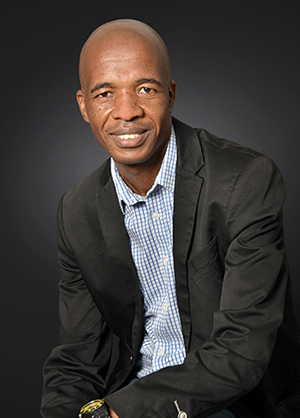

Prof Mpho Ngoepe
As one of the recipients of the 2019 Chancellor’s Award for Excellence in Research, Prof Mpho Ngoepe, from Unisa’s College of Human Sciences, says he is happy to be recognised with such an award because being recognised by one’s own institution shows that the institution values one’s work.
Having worked in the South African information science industry for about 12 years, Ngoepe, who currently holds a Y2 rating from the National Research Foundation of South Africa, joined the academe. He has consistently researched and taught across the information science discipline with a focus on archives and records management, as well as oral history and auditing over the past 21 years.
The Chair of the Department of Information Science is a prolific scholar with an impressive and sustained research profile consisting of over 60 refereed journal articles and book chapters. The refereed journals to his credit have a wide geographical spread of international, regional and national coverage. He has presented at a number of national and international conferences, and has supervised 15 master’s and nine doctoral students to completion.
Ngoepe is also the outgoing chairperson of the Gauteng Archives Advisory Council (2016-2020), which advises the MEC of Sport, Arts and Culture on issues relating to archives in the Gauteng province. He also serves on the ethics committee of the American-based Archival Education Research Institute.
One of his main research focus areas in recent years has been the International Research on Permanent Authentic Records in Electronic Systems (InterPARES) trust, which was coordinated by the University of British Columbia in Vancouver, Canada. From 2013 to 2018, he was the director of the trust, which was funded through a five-year partnership grant from the Social Sciences and Humanities Research Council of Canada. The trust comprised seven teams: North America, Latin America, Europe, Africa, Asia, Australasia and Transnational.
The project resulted in the generation of a South African National Standard (SANS) under the working group of TC171. The project also generated the audit checklist to be used by the external auditors of government, AGSA, to authenticate digital records that support the auditing process. Ngoepe says the project has had a major impact on the industry, as well as on curriculum development throughout the African continent. Additionally, there were two PhD students at Unisa in the Department of Information Science under his supervision who graduated through this project.
Ngoepe says that his research has positively impacted on society, academe and his profession. "As a director of the InterPARES Project for the African team, I was able to empower doctoral students in the Department of Information Science. As a result, two students, Dr Tshepho Mosweu and Dr Olefhile Mosweu, completed their PhDs through this project under my supervision."
"Furthermore, the project I was involved in informed curriculum development and review in the area of digital records management, which had impact for our honours programme, as well as some modules on the undergraduate level. Additionally, a number of articles were published from the projects."
He said the results of the InterPARES Project are relevant to the African setting and are geared to the empowerment of archives repositories, as practitioners were involved in the project. For example, in one of the case studies commissioned by the Auditor-General of South Africa, the team that was led by Ngoepe developed guidelines for public auditors to authenticate digital records in support of the auditing process. These guidelines were tested at Rand Water, a South African water utility company. The guidelines also informed the development of a national standard.
In speaking on the importance of this research for his field as well as Unisa and the country and continent, Ngoepe said the research contributed towards addressing "wicked problems" or grand societal challenges faced by the country especially with regard to accountability, transparency and good governance.
"It also yielded results that are relevant to the African setting and empowerment of archives repositories. As well, the research informed curriculum review at Unisa and other universities on the continent. It empowered doctoral students in the Department of Information Science, as two doctoral students who were part of the project graduated in 2019."
During this interview, Ngoepe also shared the lighter side of his personality. He said people would be surprised to know that he has a great sense of humour and that he could have even been a comedian.
His interests and hobbies include participation in road running. "On average I cover approximately 90 km a week. While running, one is able to plan and take major decisions. And I have got gold medals in a number of local races. I also read a lot, especially fiction and biographies."
When asked if there are any philosophies or inspirational messages that motivate him, Ngoepe shared this: "It does not matter where you are coming from in terms of family background, what matters is where you are going."
* By Rivonia Naidu-Hoffmeester, Communications and Marketing Specialist, College of Human Sciences
Publish date: 2020-03-05 00:00:00.0